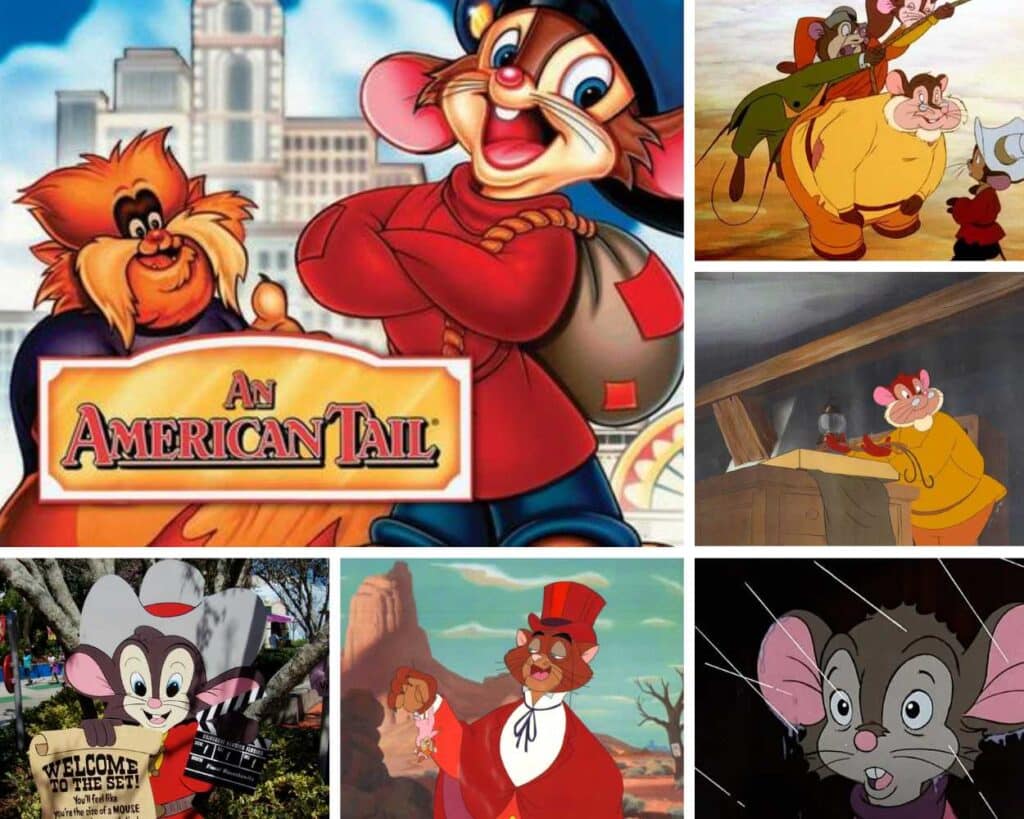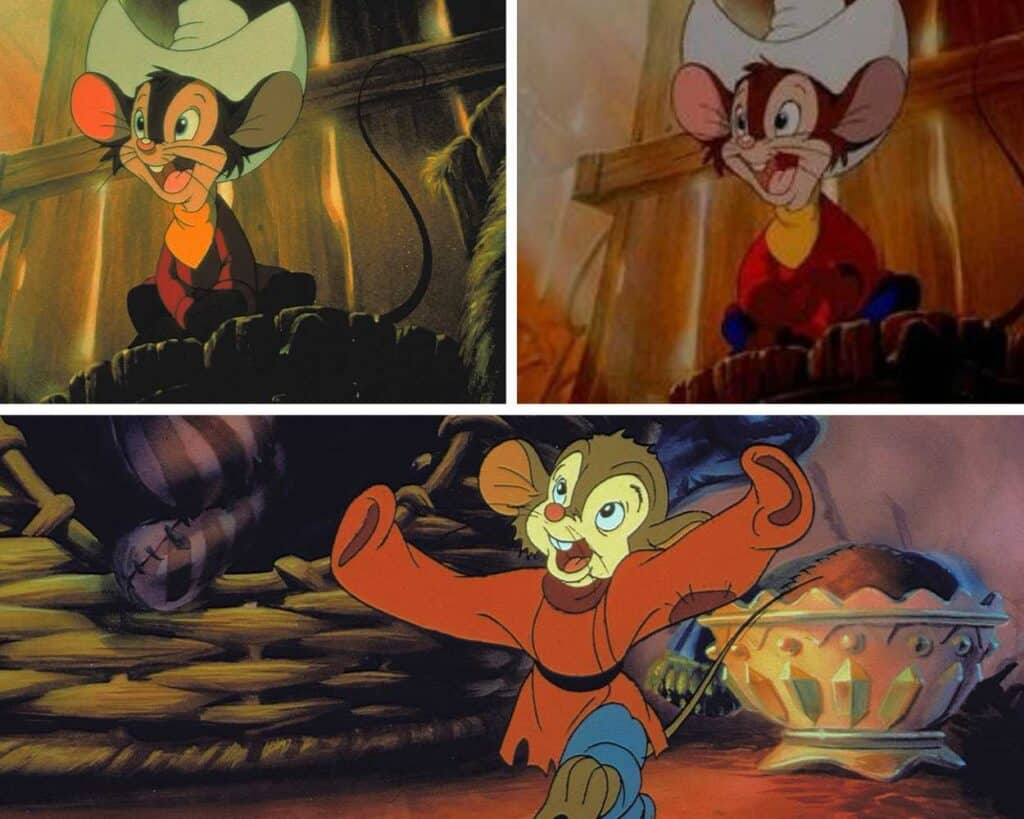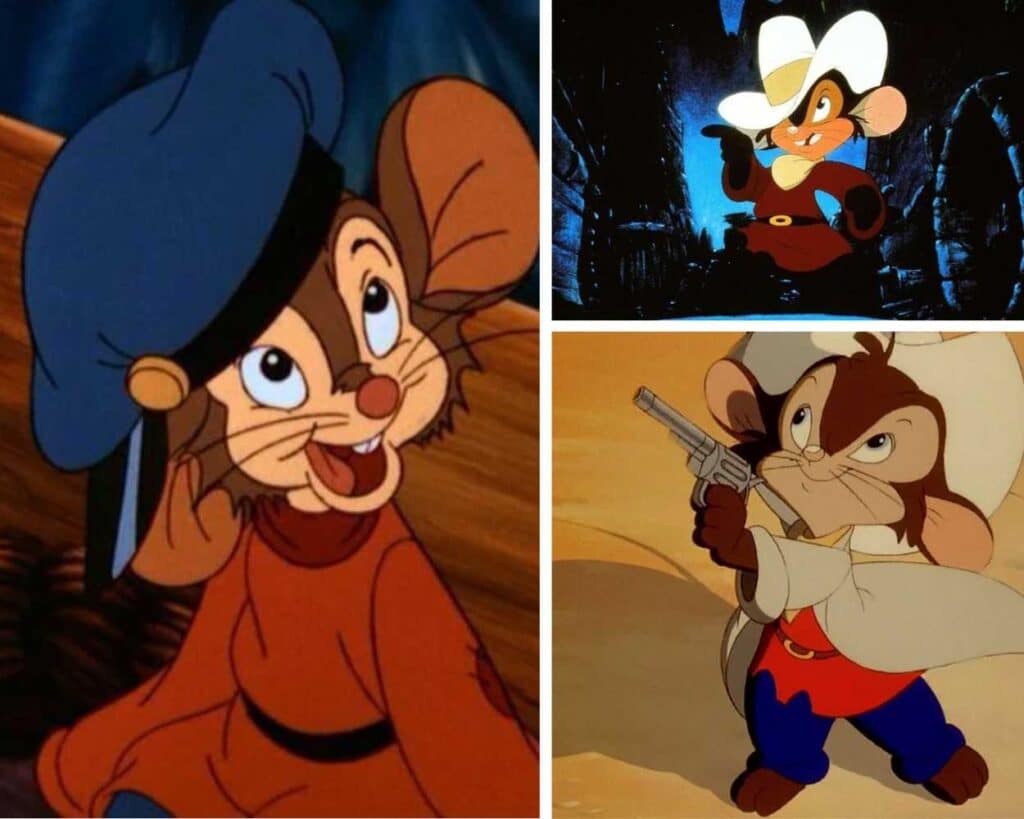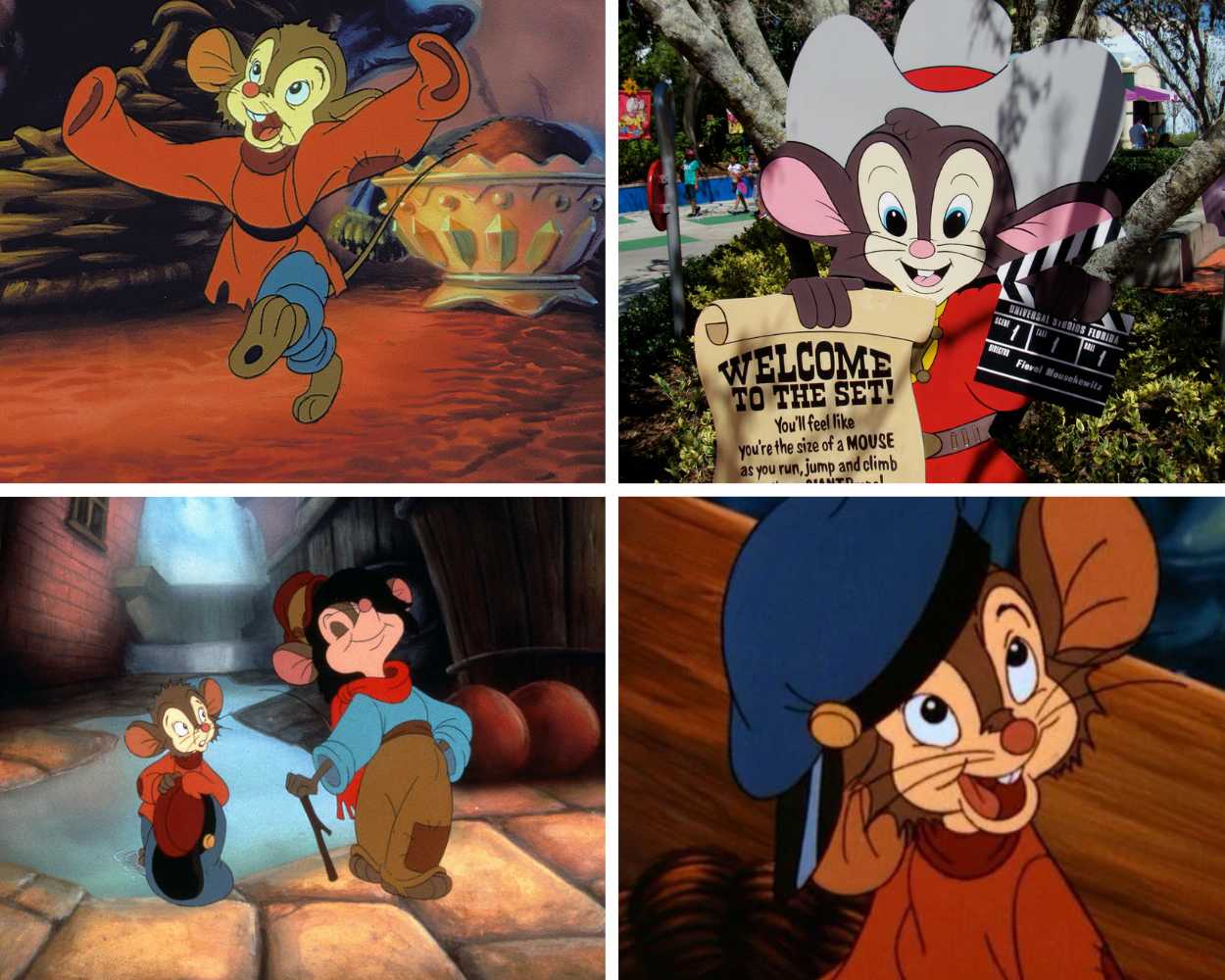Fievel Mousekewitz stars as the lead character in the An American Tail series. Mama and Papa Mousekewitz proudly call him their middle child, with Tanya as his elder sister and Yasha, his younger sibling.
Fievel’s adventurous spirit often leads him into risky situations, even if his intentions are mostly pure.
Born in 1879, Fievel turned seven during the series. By the time he shares the beginning of An American Tail: The Storybook in 1986, he’s around 107 years old, regaling tales to his great-grandchild.
Fievel Mousekewitz
Fievel, a popular mouse cartoon character, typically wears a red sweatshirt or tunic, cinched with a sash, and pairs it with blue pants. Especially in the first film, his long sleeves drape over his hands.
- He often sports an oversized blue Russian Kasket Cap. However, during “An American Tail: Fievel Goes West,” Fievel changes things up, donning a yellow bandana and transforming his blue hat into a white cowboy hat.
This new look persists until he wraps up a conversation with Wylie Burp at the movie’s conclusion. Fievel boasts dark brown fur, contrasted by lighter shades on his face, chest, and belly.
The exact hue of his fur varies across films. “Fievel Goes West” showcases the most significant redesign, presenting Fievel with a rounder face, blue eyes, pink footpads, and an older appearance.
An Optimistic Arrival, Challenging Setbacks

Fievel’s journey begins with boundless excitement as he embarks on a voyage to America, a land of dreams and opportunities. However, upon arrival, he faces numerous challenges and setbacks that test his resolve.
Yet, through it all, Fievel never loses hope or gives up. He demonstrates resilience in the face of adversity, inspiring viewers to persevere in their own struggles.
Unbreakable Bonds
Fievel’s relationships form an integral part of his story. His bond with his family is particularly heartwarming, showcasing their unwavering support for one another.
Fievel’s sister Tanya plays a vital role in their adventures, standing by his side through thick and thin. Additionally, his friendship with Tony Toponi provides a pillar of strength as they navigate their shared hardships together.
Cute Personality

In his Shotska home in Russia, Fievel receives his now-iconic hat as a Hanukkah gift from his father. Initially thinking it too large, his mother assures him he’ll grow into it.
Fievel’s father then shares the tale of the immense Mouse of Minsk, before shifting to tales of America, a dreamland with streets of cheese, plentiful mouseholes, abundant breadcrumbs, and freedom of speech. Most enticingly, they believe it’s a land without cats.
Despite Mama Mousekewitz’s caution, the mention of “cat” attracts the attention of the village-terrorizing Cossacks and their menacing “Cat-sacks.”
Fievel’s brave attempt to deter them falls short, but the feline foes eventually depart, leaving devastation in their wake. Resolute, the Mousekewitz family heads to Hamburg, Germany, embarking on a journey to America.
An American Tail: Fievel Goes West
In a sequel, Fievel emerges as an Old West hero when Cat R Waul deceitfully lures his family out West. As Fievel and his family board the train, his friend Tiger faces a chase by dogs.
Attempting to join Fievel and family on the train, Tiger plunges from a bridge into the river below, only to be later rescued. When Fievel discovers Waul’s sinister plan, he’s tossed off the train.
Soon, he teams up with Tiger and Sheriff Burp to thwart Cat R Waul’s scheme to turn mice into mouse-burgers. The Mousekewitz family eventually settles in Green River, running a thriving music store, “Mousekewitz Fine Violins.”
This film, fourth in the series but second chronologically, showcases a more upbeat and valiant Fievel. He’s initially enamored with cowboys but soon realizes his true strength lies in being himself.
An American Tail: The Treasure of Manhattan Island
In this prequel to the Mousekewitz family’s move to Green River, Fievel awakens beside Tanya after a vivid dream. He excitedly shares his vision of them moving out west and him becoming a renowned gunslinger—a nod to a future film. While Tanya remains skeptical, Fievel insists, “Well, it seemed real to me!”
As the story unfolds, Fievel allies with Native American mice, especially the Chief’s daughter, Cholena. Together, they combat the oppressive tactics of wealthy sweatshop owners tormenting Fievel’s father and their workers.
Fievel is remorseful about the European mice’s actions towards the Native American mice. While he can’t change the past, he strives to show Cholena and her tribe that some can be trusted.
Fievel’s Popularity

During the release of his first two films, Fievel’s popularity skyrocketed. He became a mascot for UNICEF and the Reading is Fundamental program, even briefly replacing Woody Woodpecker as Universal Studios’ mascot.
For a while, fans could meet him at the parks, but by 2017, only Fievel’s Playland at Universal Studios Florida remained as his footprint. The animation company Amblimation also featured Fievel as its mascot.
Furthermore, Fievel stars as the sole playable character in every An American Tail video game spin-off.
In June 2014, HBO’s Last Week Tonight with John Oliver aired a dark animated skit titled “An Actual American Tail”, showcasing a more harrowing immigration experience for Fievel, reminiscent of contemporary challenges faced by illegal immigrants. This rendition proved more somber than the original film.
Appearances
- An American Tail
- An American Tail: Fievel Goes West
- An American Tail: The Treasure of Manhattan Island
- An American Tail: The Mystery of the Night Monster
- Fievel’s American Tails
An American Tail: Fievel Goes West (1991)
Fievel Mousekewitz Quick Facts
Name Origin: The character’s name, “Fievel,” was a tribute to director Steven Spielberg’s maternal grandfather, Philip Posner, nicknamed “Fievel” in Yiddish.
Voice Actor: Fievel’s voice in the first two movies was provided by Phillip Glasser.
Cultural Impact: Fievel was significant for portraying a Jewish immigrant’s experiences in a children’s film, reflecting immigrants’ hopes and challenges in America.
Mascot Status: Beyond the films, Fievel served as a mascot for various programs, including UNICEF and Reading is Fundamental. He even briefly took Woody Woodpecker’s place as Universal Studios’ mascot.
Spin-offs: Fievel is the only playable character in all the video game adaptations of “An American Tail.”
